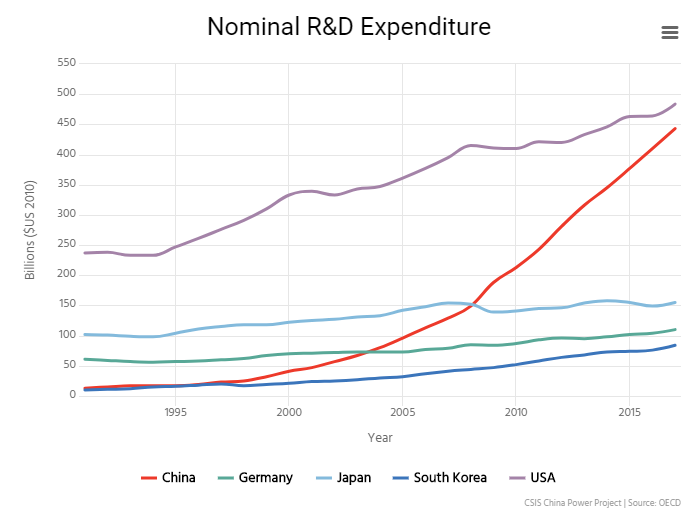“This has to be the biggest single week for UK aerospace since at least the Cold War”
– Steve Trimble, defence editor of Aviation Week in late July
Last month, a permanent new department in the Ministry of Defence was created: the Rapid Capabilities Office, or RCO.
The role of the RCO is to rapidly develop advanced military tech for the UK armed forces. It does this by funding private companies with innovative and radical ideas. It’s a bit like a venture capital fund, or a startup accelerator, except its run by the state and in pursuit of weapons rather than profits.
For the UK to play the game of great power competition, private enterprise must be increasingly twisted to the cause of gaining military advantage. The RCO has, according to Air Vice Marshall “Rocky” Rochelle, “injected a sense of innovation and urgency by supercharging, not subverting, the system”.
Cold War II will see “capitalism with Chinese characteristics” displayed all over the world and not just in China, as governments increasingly dictate the direction of travel within their economies, straddling the private sector for strategic gain. The RCO is just one signal of this, which having been run as an experiment by the UK defence establishment for two years, has now been made a permanent structure within the MoD.
State turned speculator
The biggest week for UK aerospace since Cold War I, as referred to by Trimble at the start of this letter, relates to the work of the RCO, which has begun aggressively seeking out new military capabilities.
This Cold War, so far invisible to mainstream investors, looks ever clearer as our defence ministry begins rolling the dice to maintain a competitive advantage.
Looking to mimic the methods of tech companies, the RCO has begun making small bets on technologies with game-changing potential. “We have a culture that strives to achieve 100 percent solutions but it is handicapped by risk aversion,” said Rochelle last month. “Why aren’t we doing acquisition like Google or Elon Musk?”
In pursuit of small “wingman” drones which will accompany combat jets and amplify their capabilities, the RCO has launched “Project Mosquito”. Three groups will compete to produce a decent prototype in 12 months, two of which are consortiums: Blue Bear (which includes Airbus, €AIR), Blackdawn (including Northrop, $NOC and Bombardier, CA$BBD) and Boeing’s ($BA) Phantom Works.
 UK MoD wants a drone 10% the cost of a fighter, and produced in 20% of the time
UK MoD wants a drone 10% the cost of a fighter, and produced in 20% of the time
Rochelle has also spoken about talking about the potential for the UK to develop a hypersonic weapon (a missile that can travel faster than Mach 5 without requiring gravity) in four years. The US has been trying to create one for about six, and has yet to deliver the goods (or at least publicly acknowledge it has). We’re also getting into the military satellites game.
This aggression for progress is signalling how the relatively stable globalised world order is fracturing, and that we’re heading back to state vs state competition and aggression.
As nations increasingly compete for strategic advantage, the line between state and market will become blurry – just as it is in China, which has been playing a strategic game all along. This chart alone, courtesy of the CSIS, shows how China has prioritised technological advancement to get ahead of the game:
 While the US now turns to China to compete, the UK turns to Russia. Will Jessett, the director for strategic planning for the MoD, said to the US-based publication Defence One earlier in the year that:
While the US now turns to China to compete, the UK turns to Russia. Will Jessett, the director for strategic planning for the MoD, said to the US-based publication Defence One earlier in the year that:
“You [referring to the US interviewer] call out China as being the paramount threat against which you need to plan into the future… that’s not how we see it in the UK. We have… planned much more centrally against Russia.”
As globalisation recedes and nations become more competitive, mercantilism will become increasingly obvious. Government funding and the utility that companies can provide for the government will become more important for investors.
Before I leave you for a weekend, I’ve a question for you. If I’m right and we’re in for another Cold War, do you think it will make our government any more efficient?
The author and geopolitical observer Robert Kaplan wrote recently his belief that if the US competes with China, it will lose its bureaucracy:
… merely by competing with China we will make our own institutions stronger. Such competition is all that might be left to jolt our bureaucracies out of their ongoing decrepitude and decline. Indeed, the profusion of travel orders, security clearance paperwork, unnecessary receipts, and so forth, even as the hacking of our systems continues, are all ways in which we deliberately deceive and defeat ourselves. Paperwork arises out of the lack of trust. The more paperwork, the less trust that exists within a bureaucracy. The Pentagon is a prime example of this. We should always remember that there is no regulation or procedure to instill basic common sense.
Will competing with parliament of its complacency, and instil common sense in the years to come? I’d love to know your thoughts: [email protected].
Wishing you a good weekend,
Boaz Shoshan
Editor, Capital & Conflict
Category: Market updates


